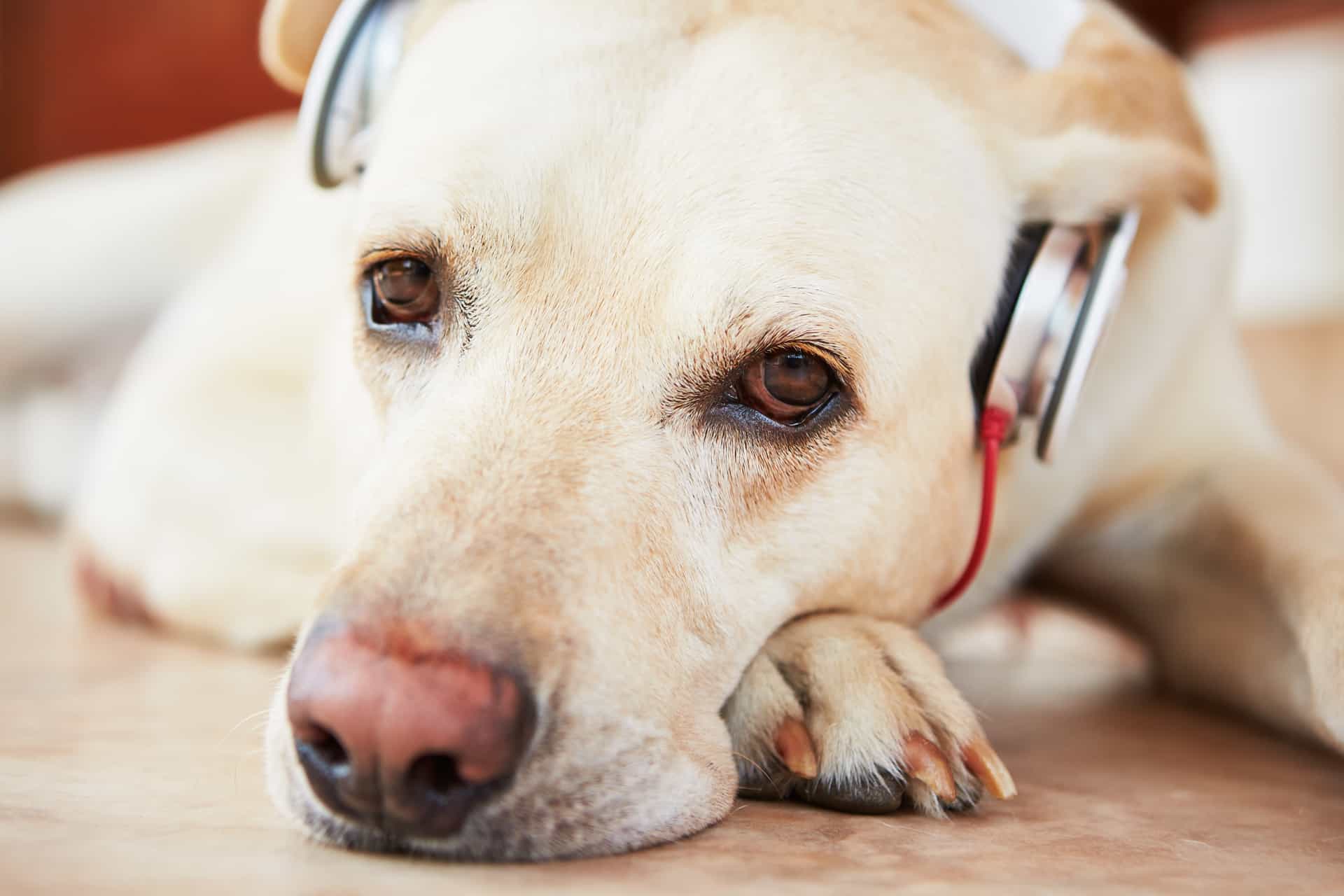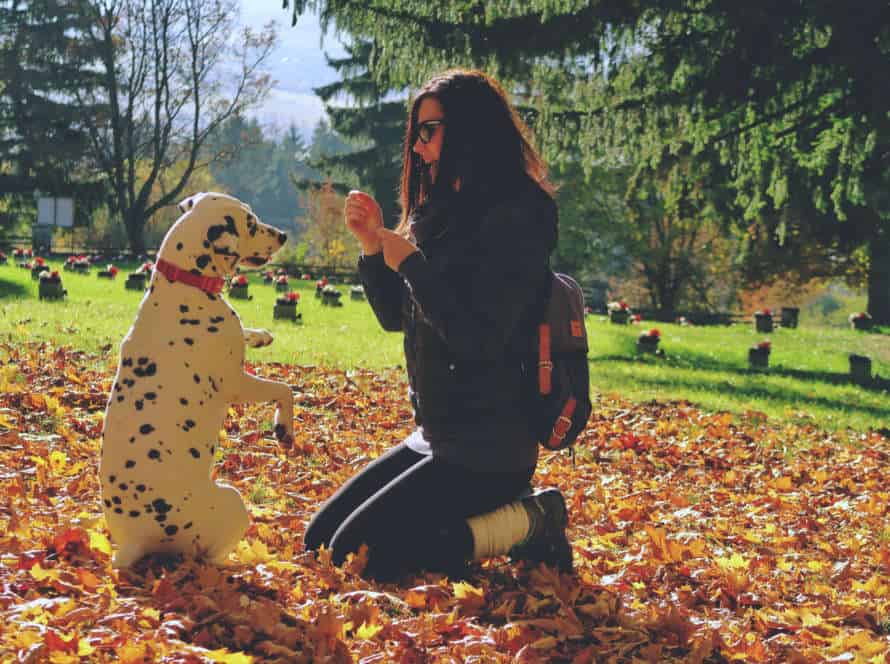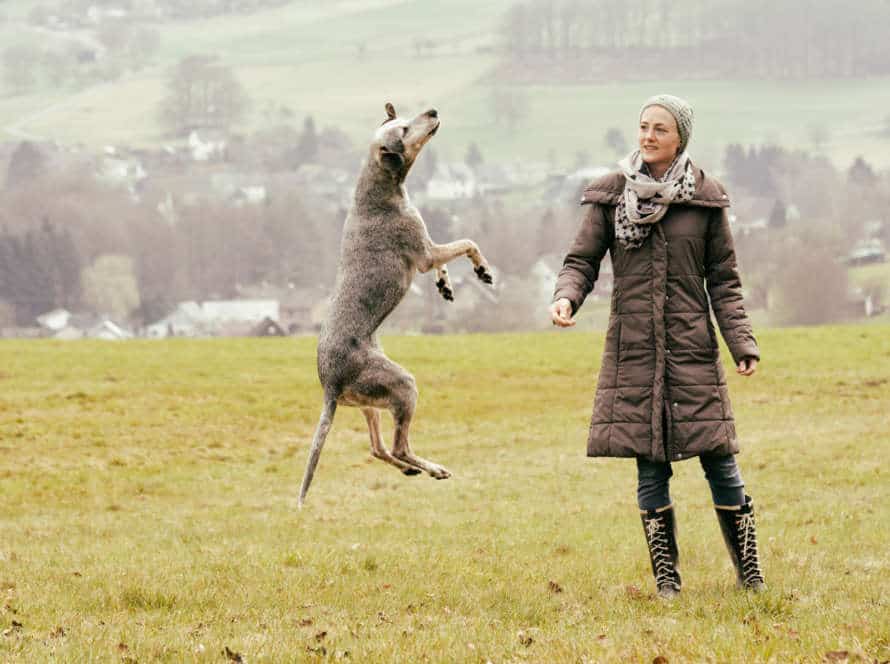Music Therapy for Dogs: Soothing Sounds to Calm Aggression
Music therapy can be a great way to help calm aggressive dogs and improve their behavior. Certain types of music can reduce feelings of fear and anxiety in pups.
Here are some examples:
- Classical music: Sweet and soothing classical tunes can help soothe an agitated pup. Studies show that dogs who listen to classical music bark less and are more relaxed.
- Nature sounds: The sound of rainfall, waves, or birds chirping can help make a pup feel more at ease.
- Reggae music: Research shows that dogs prefer reggae music over other genres. Its tempo and rhythm can help lower their heart rate and relax them.
- Soft rock: Soft rock with a low tempo can help your dog stay relaxed.
It’s important to experiment with different sounds to see what works for your pup. Music is a powerful tool for reducing aggression and anxiety in your furry pal.
Understanding Canine Aggression
Canine aggression can come from various sources. Fear, anxiety, medical conditions, and environmental issues are only some of them. To help your pup, you must figure out the cause of their aggression. Knowing the reason is the initial step to decide if musical therapy is a good option.
Common Triggers for Canine Aggression
Canine aggression can be brought on by several things. Pet owners should understand these triggers for their pup’s safety.
- Fear: Fido may become aggressive if he feels scared or threatened.
- Territoriality: Some pooches react when their space or belongings are encroached upon.
- Overstimulation: Barkers may become aggressive when exposed to loud noises, crowds, or chaotic places.
- Pain or Illness: Dogs can get reactive and aggressive when hurt or ill.
- Lack of Socialization: Lack of exposure to different people, animals, and environments can lead to aggressive behavior in pooches.
Knowing these triggers can help owners prevent and manage aggression. Music therapy is a great solution. It provides calming sounds that help relax dogs, reducing their stress levels.
The Importance of Addressing Aggressive Behavior
Aggressive behavior in dogs needs to be addressed to protect both the animal and those around them. It is necessary to identify the cause of this behavior and use strategies to prevent it.
Common causes are fear, territory, lack of socializing, and health issues. Music therapy is an option to help soothe aggression. This non-invasive technique can reduce stress and anxiety by calming the dog’s nervous system. It can address behavioral issues and help the dog relax.
If you think your pup is acting aggressively, take action right away. Look for professional help if needed. Provide a relaxed atmosphere and help the dog lead a healthier life.
What is Music Therapy for Dogs
Music Therapy for Dogs? Yes, it exists! Music is a great way to help calm any aggression issues your beloved pet might have. Play specific tunes and sounds and you can decrease anxiety. There are many techniques and types of music you can use. Let’s learn more about Music Therapy for Dogs and its benefits.
How Does Music Therapy Work to Calm Canine Aggression
Music therapy is a valuable treatment for calming canine aggression. It helps minimize stress and anxiety in dogs. It works by releasing endorphins and dopamine – hormones that have a calming effect on both people and pets. Music therapy has been linked to lower heart rate, blood pressure, and breathing-rate in dogs. This boosts their overall well-being.
Classical music is often recommended for its calming effect. White noise and instrumental sounds are particularly beneficial. Music therapy should not be used as the only solution for aggression in dogs. It should be combined with training and other methods to address the cause of the aggression.
Pro tip- Pick music and sounds that help ease your dog’s anxiety. Be patient as it may take time to show results.
Benefits of Music Therapy for Dogs
Music therapy for dogs can help them feel calmer and more relaxed. It reduces stress, pain, and aggression. It also helps dogs sleep better. But not all music is effective. The best type has a low frequency, like a mom’s heartbeat. For max results, talk to a vet or music therapist. They’ll know which music works for your pup!
Types of Music for Soothing Aggression
Music therapy is an awesome way to chill out dogs with aggression issues. It is essential to pick the proper music. Classical, ambient, and jazz tunes can be useful for calming aggressive dogs. Let’s investigate the different kinds of music that can help your pup relax!
Classical Music and its Effect on Aggressive Behavior
Classical music has been known to have a calming effect on aggressive behavior in both humans and animals. Its steady tempo can soothe the mind, reducing stress and aggression.
Moreover, other types of music such as reggae, blues, and soft rock can help calm dogs’ aggression too. They have a similar tempo and rhythm to classical music and can be calming.
Music therapy is an effective method for managing aggression in dogs. It helps them to relax and feel less anxious. Sounds like rain or ocean waves also create a peaceful atmosphere.
However, it is important to note that music therapy should not replace professional training or medical treatment. If your dog’s aggression is severe, seek help from an expert.
Pro tip: Play some relaxing music in the background when with your dog. It will create a peaceful environment for both of you.
Nature Sounds and their Calming Effect on Dogs
Playing nature sounds like calming music can soothe aggressive dogs and decrease aggression levels, giving them a general sense of tranquility. Here are some types of music to try:
- Classical Music: Proven to have a calming effect on dogs, helping them relax.
- Reggae: A slower tempo with soothing beats and repetitive rhythms – great for dogs with aggression or anxiety.
- Nature Sounds: The sound of water, birds and more, can chill them out and create a sense of serenity.
- Soft Rock: Calming melodies and slow rhythms – ideal for anxious or aggressive dogs.
Don’t forget, not all dogs react the same way to music, so experiment and find what works for your pet.
Instrumental Music and its ability to Reduce Stress
Instrumental music is known to lower stress in people and pooches. Here are some kinds of music that can lessen aggression or nerves:
- Classical music – Research has shown it helps reduce anxiety and promote relaxation in humans and dogs.
- Ambient music – It has a slow beat and minimal tune, great for a relaxed atmosphere.
- Nature sounds – Chirping birds, flowing water etc. can be calming for both humans and canines.
Instrumental music therapy is being used for many issues like tension, depression, PTSD etc. Pro Tip: Playing instrumental music is a simple way to lower stress and relax people and animals. So, when you or your furry buddy feel anxious, try some peace-inducing instrumental music.
How to Implement Music Therapy for Dogs
Music therapy can help chill and lessen aggression in dogs. You can use calming tunes to make a positive, reward-filled atmosphere. This assists your pup to relax in their environment. Here are some tips for music therapy for dogs! These tips can help you get started and ensure your pup enjoys the session.
Choosing the Right Music for your Dog
Choosing the right music for your pup can have a big impact on their behavior and mood. Consider their personality and needs when selecting music. Calm classical or soft rock, reggae and some jazz are popular choices. Pick something your dog likes and finds soothing.
When implementing music therapy, play it during times of stress or anxiety. When away from home, during fireworks or thunderstorms. Start playing when they’re relaxed and in a familiar environment. Increase the volume as they get used to it. Choose music that’s right for their age and personality. Avoid music with loud, sudden noises and heavy bass. Pro Tip!
The Best Time to Play Soothing Music
To help calm your dog during times of stress, like thunderstorms, fireworks or separation anxiety, introduce music therapy!
Choose music especially designed for dogs, with slow tempo, simple melodies and low frequency tones.
Play the music at a low volume so your pup’s sensitive ears aren’t overwhelmed.
Play it before a stressful event to help your pup relax.
You could even use a portable speaker or headphones to provide the music directly to your pup.
By using these tips, you can help your dog’s aggression and alleviate anxious feelings.
Tips for Optimizing the Use of Music Therapy
Music therapy can be useful for easing a pup’s aggression or anxiousness. But, it’s important to get it right for the desired results. Here are some tips for making the most of music therapy for dogs:
- Choose the Right Tunes: Slow-paced music with minimal words works best. Classical tunes, ambient music, or music made just for dogs can help.
- Be Constant: Dogs like consistency, so playing music when they’re anxious or aggressive brings a soothing effect.
- Adjust the Volume: Low volume is key. Start quietly and gradually raise it until you see the desired effect.
- Add Other Therapies: Use music therapy with exercise, play, and training, to keep them calm and content.
- Time it Right: Start the music a few minutes before your pup might show aggression or fear. This will give them time to adjust to the calming sounds.
Music therapy can be a great, easy way to help dogs with aggression or anxiety. With these tips and making music therapy part of their routine, pet owners can keep their furry friends relaxed and happy.
Additional Strategies for Managing Canine Aggression
Dogs who become aggressive can be hard to handle. This causes frustration for their owners. Music therapy can help, but there are more strategies. Positive reinforcement, management, training, and medications are all potential solutions. Try them out!
Training Techniques to Address Aggressive Behavior
Aggressive behavior in dogs can be a problem. Training techniques, such as music therapy, can help. This therapy uses soothing sounds to calm aggression.
If your pup is showing signs, here are some steps to use music therapy:
- Choose music with a slower beat and natural sounds – like running water, rain or birds.
- Create a peaceful environment for your pup to listen to the music.
- Play the music as background noise when you do activities with your pup. This will help make a positive connection between music and relaxation.
- Get help from a qualified dog trainer or vet. Music therapy alone may not be enough to address the underlying causes of the aggression.
Behavioral Therapy for Dogs with Aggressive Tendencies
Behavioral therapy is a good way to deal with aggressive dogs. Music therapy can be used to calm them. Soothing music can make them less stressed and stop their aggression. Studies show classical or instrumental tunes are most helpful. Here are some tips:
- Play calming music during your dog’s daily routine.
- Check their reaction to the music and adjust the volume and genre.
- Try different types of music to see what works for them.
- Combine music therapy with behavioral modification techniques for long-term results.
- Pro Tip: Talk to a professional dog trainer or behaviorist for an effective plan.
Medication and Supplements for Aggressive Dogs.
Music therapy is a drug-free way to manage canine aggression. Research shows that soothing music can reduce anxiety and stress in dogs, making them calmer.
Types of music shown to have a calming effect on dogs include:
- Classical Music: Its slow tempo can reduce barking, growling, and other aggressive behaviors.
- Reggae Music: Can help dogs relax and lessen anxiety and aggression.
- Soft Rock Music: Helps dogs, especially those with anxiety issues, relax.
When using music therapy, use a calming playlist designed for dogs. Play it at a low volume to avoid overstimulation.
Remember: Training, exercise, and socialization are also important to manage canine aggression.
Frequently Asked Questions
Q: What is music therapy for dogs?
A: Music therapy for dogs is a therapeutic approach that uses soothing sounds and music to calm down dogs that are experiencing stress, anxiety, or aggression. The music used in this therapy is specifically designed to mimic the natural sounds that dogs hear in their environment, and it is intended to create a calming effect on the dog’s nervous system.
Q: How does music therapy help with aggression in dogs?
A: Dogs that are aggressive may be experiencing high levels of stress or anxiety, which can cause their aggression. Music therapy for dogs can help to alleviate these feelings of stress and anxiety by providing a calming soundtrack and reducing their heart rate and blood pressure. As a result, the dog is likely to become more relaxed and less likely to lash out or become aggressive.
Q: What types of music are used in music therapy for dogs?
A: The music used in music therapy for dogs is typically slow, calming, and soothing. It may include classical music, nature sounds such as rainfall or bird songs, or even specially designed music that is intended to mimic the heartbeat of a dog’s mother. The key is to choose music that is unlikely to cause any excitement or anxiety in the dog.
Q: Can music therapy be used to treat other behaviour problems in dogs besides aggression?
A: Yes, music therapy can be helpful in treating a range of behaviour problems in dogs, including separation anxiety, hyperactivity, and even noise phobias such as fear of fireworks or thunderstorms. It is important to choose the right type of music for each individual dog and to use it in conjunction with other behavioural interventions as needed.
Q: Is music therapy safe for all dogs?
A: Music therapy is generally safe for most dogs. However, it is important to choose the right type of music for each individual dog, as some music may cause anxiety or agitation in certain dogs. It is also important to monitor the dog’s response to the music and adjust the volume or type of music as needed.
Q: Can I use music therapy in combination with other therapies?
A: Yes, music therapy can be used in combination with other therapies such as behaviour modification and medication. It is important to work with a qualified professional to create a comprehensive treatment plan that addresses all aspects of the dog’s behaviour problem.







